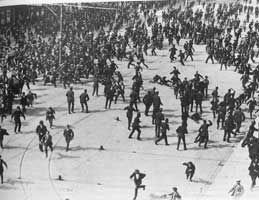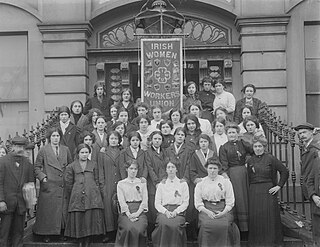Related Research Articles

Thomas Ryder Johnson was an Irish Labour Party politician and trade unionist who served as Leader of the Opposition from 1922 to 1927 and Leader of the Labour Party from 1917 to 1927. He served as a Teachta Dála (TD) for Dublin County from 1922 to 1927. He was a Senator for the Labour Panel from 1928 to 1934.

The Irish Citizen Army, or ICA, was a small paramilitary group of trained trade union volunteers from the Irish Transport and General Workers' Union (ITGWU) established in Dublin for the defence of workers' demonstrations from the Dublin Metropolitan Police. It was formed by James Larkin, James Connolly and Jack White on 23 November 1913. Other prominent members included Seán O'Casey, Constance Markievicz, Francis Sheehy-Skeffington, P. T. Daly and Kit Poole. In 1916, it took part in the Easter Rising, an armed insurrection aimed at ending British rule in Ireland.

James Larkin, sometimes known as Jim Larkin or Big Jim, was an Irish republican, socialist and trade union leader. He was one of the founders of the Irish Labour Party along with James Connolly and William O'Brien, and later the founder of the Irish Worker League, as well as the Irish Transport and General Workers' Union (ITGWU) and the Workers' Union of Ireland. Along with Connolly and Jack White, he was also a founder of the Irish Citizen Army. Larkin was a leading figure in the Syndicalist movement.

The Communist Party of Ireland is an all-Ireland Marxist–Leninist party, founded in 1933. The party is a member of the International Meeting of Communist and Workers' Parties.

The Dublin lock-out was a major industrial dispute between approximately 20,000 workers and 300 employers which took place in Ireland's capital city of Dublin. The dispute lasted from 26 August 1913 to 18 January 1914, and is often viewed as the most severe and significant industrial dispute in Irish history. Central to the dispute was the workers' right to unionise.
The Workers' Union was a general union based in the United Kingdom, but with some branches in other countries. During the 1910s, it was the largest general union in the UK, but it entered a rapid decline in the 1920s, and eventually became part of the Transport and General Workers' Union (TGWU).

The Irish Transport and General Workers Union (ITGWU), was a trade union representing workers, initially mainly labourers, in Ireland.

William O'Brien was a politician and trade unionist in Ireland. While rarely dominating the political spotlight, O'Brien was incredibly powerful and influential behind the scenes, maintaining a firm grip over Ireland's trade unions for many decades. Besides his leadership in the trade unions, O'Brien was a founder, alongside James Larkin and James Connolly, of the Labour Party of Ireland. In later years a rift formed between Larkin and O'Brien that would last the rest of their lives and often divide the labour movement in Ireland.
The Workers' Union of Ireland (WUI), later the Federated Workers' Union of Ireland, was an Irish trade union formed in 1924. In 1990, it merged with the Irish Transport and General Workers Union to form the Services, Industrial, Professional and Technical Union (SIPTU).

Anarchism in Ireland has its roots in the stateless organisation of the túatha in Gaelic Ireland. It first began to emerge from the libertarian socialist tendencies within the Irish republican movement, with anarchist individuals and organisations sprouting out of the resurgent socialist movement during the 1880s, particularly gaining prominence during the time of the Dublin Socialist League.
Sam Kyle was an Irish trade unionist and politician.

Matthew Merrigan was an Irish socialist and trade unionist from Dublin, known for his catchphrase "Profits are wages that have not been distributed yet."

The Belfast Dock strike or Belfast lockout took place in Belfast, Ireland from 26 April to 28 August 1907. The strike was called by Liverpool-born trade union leader James Larkin who had successfully organised the dock workers to join the National Union of Dock Labourers (NUDL). The dockers, both Protestant and Catholic, had gone on strike after their demand for union recognition was refused. They were soon joined by carters, shipyard workers, sailors, firemen, boilermakers, coal heavers, transport workers, and women from the city's largest tobacco factory. Most of the dock labourers were employed by powerful tobacco magnate Thomas Gallaher, chairman of the Belfast Steamship Company and owner of Gallaher's Tobacco Factory.

The Irish Women Workers' Union was a trade union which was set up at a meeting on 5 September 1911 in Dublin, Ireland. The meeting had been organized by Delia Larkin. The union was created because other trade unions of the time excluded women workers.

Patrick Thomas Daly, known as P. T. Daly was an Irish trade unionist and politician.
The 1913 Sligo Dock strike in the port of Sligo in northwest Ireland was a labour dispute lasting 56 days from 8 March to 6 May 1913. During the strike, there were numerous clashes on the docks and riots in the town, resulting in one fatality. Occurring six months earlier than the Dublin Lockout, it was regarded as a precursor to that action and a successful application of the Irish Transport & General Workers Union’s strategy for workers rights by James Larkin and James Connolly. It resulted in victory for the workers. James Larkin considered the 1913 victory in Sligo to be a major achievement of the ITGWU.

Walter Carpenter was a prominent socialist and trade union organiser active in Ireland in the early 20th century.
Hugh Lyon was a Scottish trade union leader.
John Swift (1896–1990) was an Irish trade union leader.
The Socialist Party of Ireland (SPI) was a small political party in Ireland associated with James Connolly.
References
- 1 2 Keogh, Dermot (1982). The rise of the Irish working class. Appletree Press. p. 135. ISBN 0904651754.
- 1 2 3 Hyman, Richard (1971). The Workers' Union. Oxford: Clarendon Press. pp. 30, 63–66.
- ↑ Nevin, Donal (2006). James Larkin: Lion of the Fold. Gill and Macmillan. ISBN 0717162095.
- ↑ "Belfast and the North". Irish Times. 17 July 1911.
- ↑ The Labour Who's Who. London: Labour Publishing Company. 1924. p. 74.
- ↑ Labour Party, Report of the Twenty-second Annual Conference of the Labour Party, pp.255-272